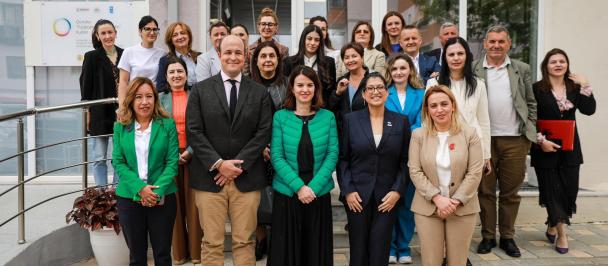Accelerating, advancing and sustaining participation of Women and Girls in Science
February 11, 2023

Today is International Day for Women and Girls in Science and the theme this year is “IDEAS: Bringing Everyone Forward for Sustainable and Equitable Development”. Broken down, the theme is a call to Innovate, Demonstrate, Elevate, Advance, and Sustain participation of women and girls in science.
Despite an improvement in recent years, women remain underrepresented in Science, Technology and Innovation (STI) and in Science, Technology, Engineering and Maths (STEM). According to the 2022 WIPO World Intellectual Property Indicators Report, women inventors accounted for only 16.5% of inventors listed in international patent applications with men accounting for the remaining 83.5%. The report further indicates that only about 33.3% of patent applications named at least one woman as inventor in 2021 while 95.9% named at least one man as inventor. Similarly, according to a UNESCO Report, only 28% of engineering students and one third of scientific researchers are women. Add to this is the fact that only 3% of Nobel Laureates are women with only a handful of them awarded to female scientists since the award’s inception in 1901.
The above statistics notwithstanding, there is evidence of some encouraging and positive change happening particularly on the African continent. For instance, in my previous article on this occasion, I give examples of innovations pioneered by female scientists in Ghana to accelerate achievement of SDGs. I also highlight a slight increase in participation of girls in STEM courses and of women in science leadership such as in the African Academy of Sciences and the Royal Academy of Science.
In Ghana and across the continent, female scientists continue to spearhead ambitious interventions whose influence on solving societies problems cannot be denied. Whereas many countries embrace the innovative capacity of women and can demonstrate the significance of having more women in science, most countries are lagging behind on how to Elevate, Advance and Sustain female participation in the science field. To accelerate progress in these areas, I propose the following catalytic aspects that countries can draw upon:
Build business and financial competence
Unlike their male counterparts, women in science face serious challenges and an arduous journey in accessing funds to advance their research, publish in scientific journals and eventually in patenting or monetising their innovations. Besides mentoring and training opportunities, strategies for improving women’s access to business and financial literacy are necessary for building successful science-based enterprises. This means empowering female scientists with the relevant financial tools and skills that go beyond the core research competencies.
Leverage networks and communities of practice
There is urgent need to create awareness and empower current and upcoming female scientists on how they can leverage the available opportunities in the science field. By establishing or strengthening local and regional networks for women in STI/STEM, women and girls can share and benefit from their collective knowledge and experience. Building strong communities of like-minded women across generations and borders will help to inform and educate about women’s participation in STEM. The networks, whether online or physical, will enhance social connections that are crucial for the women’s personal and career advancement thus accelerate representation of women both in classrooms and boardrooms.
Strengthen support ecosystems for inclusion and retention
Addressing the underrepresentation of women and girls in science requires an accelerated holistic approach (UNESCO), to attract and retain women and girls in science. This calls for multi-stakeholder partnerships between academia, government, businesses and private sector, collaborating and working together to promote gender equity in science policy and practice. It also calls for the participation of men as allies in supporting and uplifting their female colleagues. Equal inclusion in STEM ultimately benefits society as a whole.
Conclusion
The full and equal participation of women and girls in science is necessary now more than ever before. The numerous challenges facing today’s global community from combating climate change to improving health requires recognition of women’s untapped talent, potential and contribution in making the world more sustainable. While much has been done, a lot more needs to be done to increase female participation in science quantitatively and qualitatively. We need to break the societal and cultural barriers hindering women from entering the science field and seal the “leaky pipeline” that prevents them from staying and succeeding in the field.
The numerous challenges facing today’s global community from combating climate change to improving health requires recognition of women’s untapped talent, potential and contribution in making the world more sustainable.Angela Lusigi

 Locations
Locations


